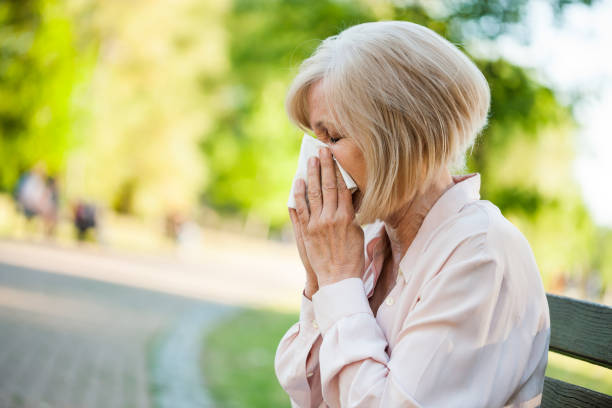As we age, our bodies continue to surprise us in many ways, including the development of new allergies. Yes, you heard that right — seniors are not exempt from the sneezing, itching, and other discomforts that allergies bring.
While we often associate allergies with childhood or young adulthood, the golden years can also be when new allergies or existing ones intensify. This can be a surprising and challenging aspect of aging, but understanding the common allergic triggers can go a long way in managing and mitigating symptoms. Let’s delve into the world of senior allergies.
Contents
What Are the Most Common Senior Allergies and How to Deal With Them
As seniors navigate the complexities of aging, it’s crucial to recognize that allergies can be a part of the journey. As surprising as it might be, seniors are susceptible to a variety of allergens. Here are some of the most common allergies faced by seniors and some tips to manage them.
Pollen Allergies
Pollen allergies, often referred to as hay fever or seasonal allergies, are common in seniors. These allergies occur when the immune system mistakes harmless pollen for a dangerous invader, resulting in an allergic reaction. Symptoms can include sneezing, itchy or watery eyes, a runny nose, and a sore throat. It’s essential to monitor local pollen forecasts and limit outdoor activities when pollen counts are high to manage pollen allergies.
Mold Allergies
Mold allergies can be particularly troublesome for seniors, especially those with respiratory conditions. Mold spores can trigger allergic reactions, causing symptoms such as sneezing, itching, and difficulty breathing. Seniors are advised to maintain a clean and dry environment, use air purifiers, and avoid areas known for high mold concentrations, like damp basements or garages, to manage mold allergies,
Pet Allergies
Pet allergies are another common type of allergy among seniors. These allergies occur when the immune system reacts to proteins in a pet’s skin cells, saliva, or urine. Symptoms can range from itchy skin to more serious respiratory issues. Managing pet allergies often involves minimizing contact with pets, using hypoallergenic pet products, and maintaining a clean environment to reduce allergen levels.
Food Allergies
Food allergies are less common in seniors, but they can occur. These allergies occur when the immune system reacts negatively to certain foods. Symptoms can range from mild reactions, such as hives or digestive issues, to severe reactions, like anaphylaxis. Managing food allergies typically involves identifying and eliminating the offending food from the diet.
Drug Allergies
Seniors are often required to take multiple medications, increasing the risk of a drug allergy. Symptoms can include hives, fever, rash, and in severe cases, anaphylaxis. It’s crucial for seniors to communicate any medication allergies to their healthcare providers and for providers to consider potential allergic reactions when prescribing medications.
Understanding the common triggers of allergies can help seniors and their caregivers manage and mitigate the impact of allergies on their health and quality of life. Seniors can make their golden years truly golden by taking necessary precautions and seeking treatment when needed.
How Serious Are Senior Allergies?
It’s important to recognize that allergies can be serious, even in seniors. Senior allergies can sometimes lead to anaphylaxis, a life-threatening reaction characterized by difficulty breathing and low blood pressure. If you or your loved one experience severe allergy symptoms, medical help should be sought immediately. Proper diagnosis and treatment from an allergist can help seniors manage their allergies and mitigate the risks of anaphylaxis or other serious reactions.
What Should You Do if You Suspect an Allergy in a Senior?

If you suspect your senior loved one may have allergies, seeking medical help is important. An allergist can conduct tests to determine the specific allergens and create a personalized treatment plan. Treatment options will depend on the type of allergy and its severity but typically involve immunotherapy, lifestyle modifications, or medications. Educating yourself and your senior loved one about the risks of allergies can help ensure that symptoms are properly managed.
It’s also important to be aware of the signs and symptoms of anaphylaxis and seek emergency medical help if necessary. Knowing what to look for can save a life in case of a severe allergic reaction. Fortunately, with proper diagnosis and treatment, senior allergies can be managed, and the golden years can remain just that.
By understanding common allergies in seniors, staying informed about the risks of serious reactions, and seeking medical help when necessary, seniors and their caregivers can work together to keep allergies from getting in the way of living a happy life. With this knowledge comes peace of mind for both seniors and their loved ones.
Are Allergies in Seniors Treatable?
Yes, many allergies in seniors are treatable. Treatment will depend on the type and severity of the allergy but typically involves immunotherapy, lifestyle modifications such as avoidance of allergens, or medications.
For example, medications like antihistamines can help reduce allergy symptoms such as sneezing, itching, and runny nose. Immunotherapy, sometimes called “allergy shots,” uses small doses of allergens to desensitize the body over time. Plus, lifestyle modifications can make a big difference in managing allergies.
For instance, avoiding outdoor activities when pollen counts are high or changing your diet if you have a food allergy can help reduce exposure to allergens. With proper diagnosis and treatment, seniors can effectively manage their allergies and reap the rewards of a happy, healthy life.
How Can Caregivers Help Seniors Manage Allergies?
For caregivers of senior loved ones with allergies, it’s important to be informed about the condition and aware of the signs and symptoms. Understanding the type and severity of the allergy, as well as its triggers and treatment options, can help caregivers provide support to their senior loved ones.
Caregivers should be familiar with emergency protocols in case of anaphylaxis or other severe reactions. Knowing what to do in a medical emergency can make all the difference for seniors who experience a life-threatening event.
Finally, it’s important for caregivers to help seniors maintain a clean and dry environment that limits exposure to allergens. Regularly cleaning their living spaces, using air purifiers, and avoiding areas with high concentrations of mold or pollen can make a world of difference in managing allergies. With the right knowledge and support, seniors can live a life free from the burden of allergies.
Conclusion
Allergies can be a source of frustration for seniors and their caregivers, but with the right diagnosis and treatment plan, they don’t have to be. By understanding common types of allergies in seniors, staying informed about risks associated with severe reactions, and providing support throughout treatment, caregivers can help seniors manage their allergies and lead happy, healthy life.
If you or your senior loved one suspects an allergy, speaking with a medical professional is important to get the right diagnosis and treatment plan. With the appropriate knowledge and precautions in place, seniors can enjoy their golden years free from the burden of allergies.

